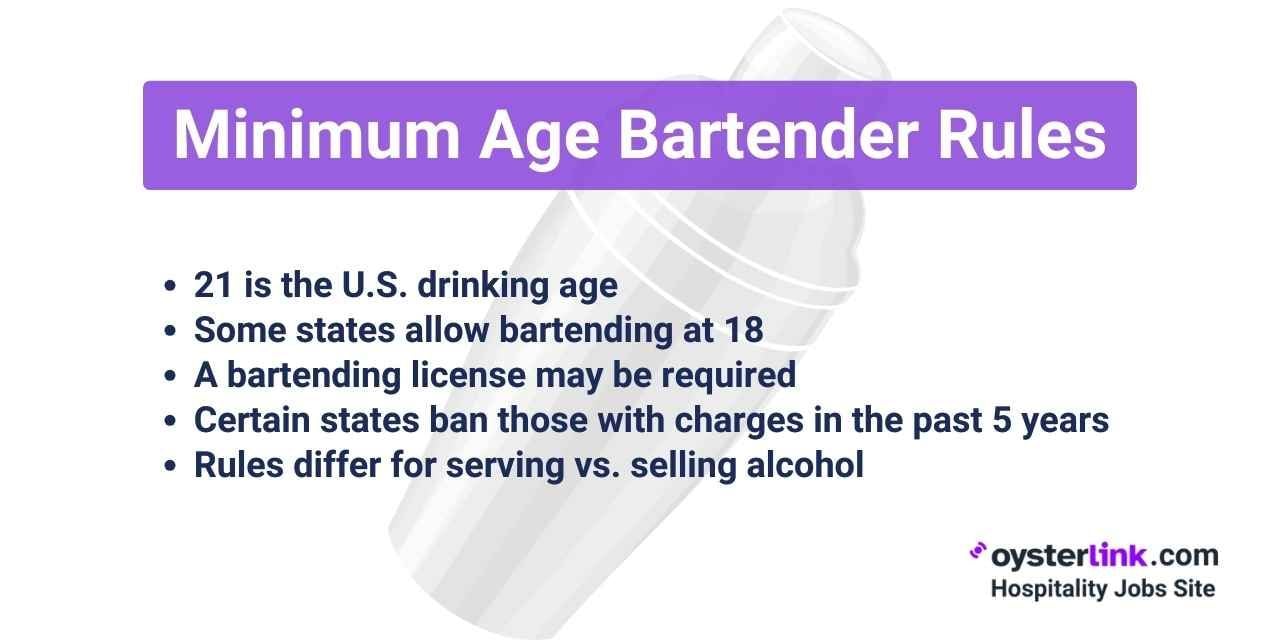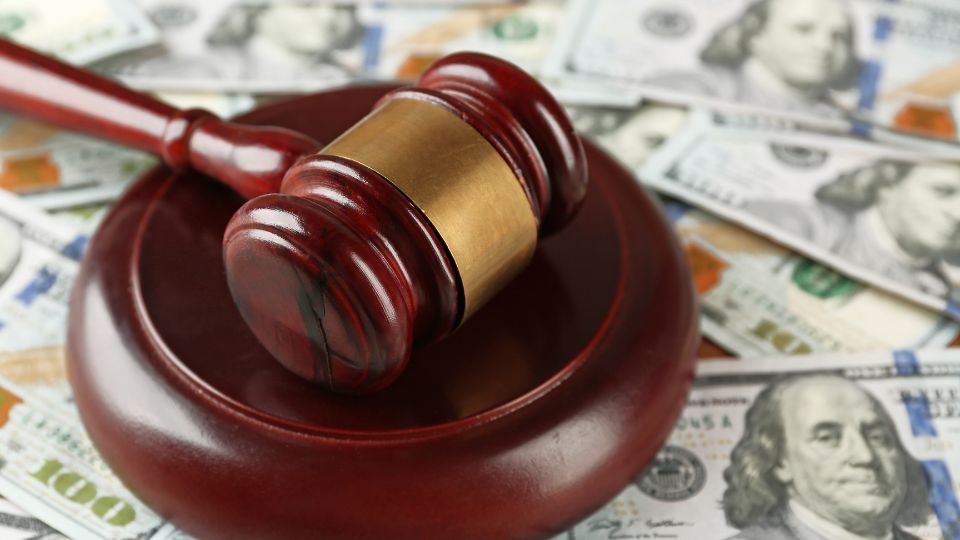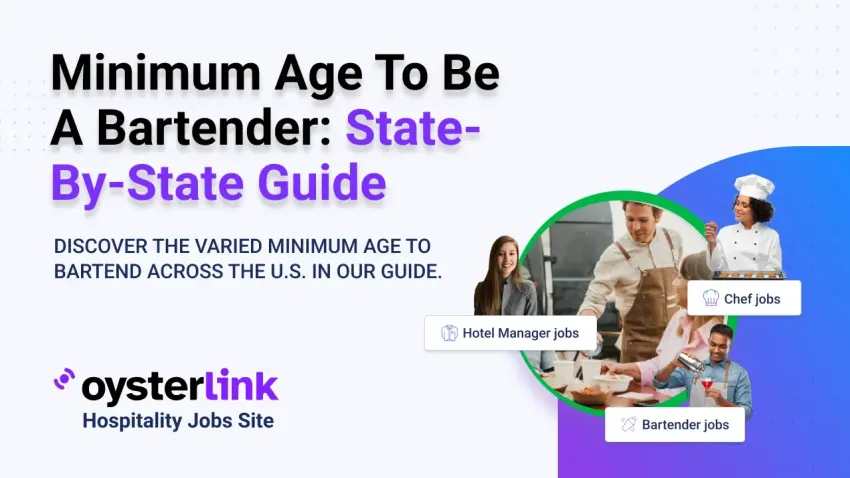The minimum age to be a Bartender in the U.S. varies by state, usually between 18 and 21. Local rules may set stricter limits. State alcohol laws determine how old you must be to work as a Bartender and outline conditions for serving in bars or restaurants.
This guide explains the age requirements across the country and what to check before applying.
Minimum Age Bartender Laws and General Legal Requirements
Each U.S. state has its own rules for serving alcohol. The legal drinking age nationwide is 21, but some states allow you to work as a Bartender at 18. In many states, there are additional legal requirements you must meet before starting the job.
Some of them require you to have a bartending license while others allow almost anyone to work in this role. The required training to receive your bartending license or certificate also varies on a state level.

Some states restrict who can work as a Bartender based on criminal history, often disqualifying those with charges in the past five years.
Also note that rules for serving alcohol in open containers differ from those for selling packaged liquor, so the minimum age to be a Bartender may not match the minimum for working in stores.
Bartending vs. Serving Alcohol: What’s the Difference?
Bartending means preparing, mixing, and serving drinks. Bartenders check IDs, monitor intoxication and ensure safe alcohol service.
Serving alcohol means delivering already prepared drinks to customers. Servers and barbacks handle this role, and they also check IDs before taking orders.
See also: How Old Do You Have To Be To Serve Alcohol Across the US?
State-by-State Minimum Age Bartender Requirements

Some states have different minimum age requirements for bartending depending on the type of alcoholic beverages being served.
For example, in Maryland and North Carolina, you can serve wine and beer at 18, but you have to be at least 21 to serve spirits. In Ohio, you can serve beer as a Bartender at 18, but have to be 21 to serve wine and spirits.
Also, cities and counties in some states are allowed to set their own minimum age requirement for Bartenders. They can't go below the number set by the state, but they can set a higher minimum age if they choose to do so.
Overall, it's important to do your research on both local and state laws before applying for the position of a Bartender, as some areas have rather tricky alcohol-related legislation in place.
The table below shows the minimum age for bartending across all 50 states plus the District of Columbia, as reported by the Alcohol Policy Information System:
Note: West Virginia has recently altered its laws regarding alcohol service to allow individuals aged 16 to serve liquor. However, to do so, these younger employees have to be supervised by someone who is 21 or older.
Minimum Age Bartender Requirements in 5 Major Cities
If you're an aspiring Bartender in one of the country's major cities, start by learning their specific laws for bartending. With that said, let's take a look at how Miami, New York City, Chicago, Los Angeles and Las Vegas approach minimum age requirements for serving alcohol:
1. Miami, Florida
In Miami, you have to be at least 18 to serve alcohol, which aligns with Florida state law. Additionally, you don't need a bartending license to serve alcohol in Florida.
2. NYC, New York
In New York City, you can work as a Bartender once you're 18 — and the same goes for the rest of the state. Similar to Miami, you do need to have a bartending license in NYC.
3. Chicago, Illinois
While the minimum age for Bartenders in Illinois is 18, the laws are different in Chicago. The city requires you to be at least 21 to serve alcohol. You also need to have a bartending license and renew it every three years.
4. Los Angeles, California
Los Angeles has the same minimum age requirement for working as a Bartender as the rest of California. You have to be at least 21 to serve alcohol and you need to have a bartending license, which you have to renew every three years.
5. Las Vegas, Nevada
Like in the rest of Nevada, you have to be at least 21 to work as a Bartender in Las Vegas. Nevada also requires you to hold a bartending license and renew it every four years.
Steps for Becoming a Bartender if You're Underage
If you don't meet the legal age requirement in your state and want to become a Bartender, consider starting at a non-bartending position, such as a Barback or Server. These roles can help you gain experience and prepare for a Bartender role once you're old enough.
In some states, however, you can legally start earlier. This video from @the_teenage_bartender shows how he began bartending at 18 and built hands-on experience behind the bar.
Another good idea is to research bartending courses in your state. If permitted, you can take a course before reaching the legal bartending age.
Minimum Age Bartender Rules: Legal Risks of Working Underage
Working as a Bartender before you meet the age requirement set by your state can result in significant penalties. This is often applicable to both the underage individual working in the role and the establishment that hired them.
States enforce such strict laws to prevent alcohol from being sold, prepared and/or served by individuals who may not have the maturity or legal authority to handle such responsibilities.
Consequences for Minors
If a minor unlawfully works as a Bartender, they can face:
- Fines: Some states impose financial penalties on underage individuals who illegally serve alcohol. This can range from $100 to $1,000 depending on the jurisdiction.
- Criminal charges: In certain states, an underage Bartender could be charged with a misdemeanor, leading to community service, probation or even a criminal record.
- Future employment consequences: A violation could affect a minor’s ability to work in the hospitality industry later. After all, many employers conduct background checks that may flag past alcohol-related offenses.
Penalties for Businesses

Establishments that allow minors to bartend without proper exceptions (such as specific training programs) can face:
- Hefty fines: Businesses that employ underage Bartenders may receive a fine anywhere from $500 to over $10,000. The amount will depend on the severity of the violation and whether it’s a repeat offense.
- Liquor license suspension or revocation: State liquor boards have the authority to suspend or permanently revoke an establishment’s alcohol license for allowing a minor to prepare, serve and/or sell alcohol. Losing a liquor license can severely impact a bar or restaurant’s revenue, as alcohol sales are a major source of income.
- Criminal charges: Sometimes, the owner, manager or license holder might face criminal liability for knowingly allowing underage employees to bartend. This could result in jail time, probation or additional legal penalties.
Why These Laws Are Strict
Laws prohibiting minors from bartending exist mainly to prevent underage drinking, alcohol-related accidents and liability issues. Those who engage in bartending activities before reaching the legal might be:
- More susceptible to peer pressure
- Lacking proper judgment when checking IDs
- Unaware of local alcohol laws
By enforcing strict regulations, states aim to reduce the risk of alcohol being served to minors or overly intoxicated individuals.
Businesses that violate these laws not only risk severe financial and legal consequences but also damage their reputation within the industry. A single violation could result in negative press, loss of customer trust and even permanent closure in extreme cases.
So, before hiring a Bartender, employers must verify age requirements based on state laws and ensure all staff handling alcohol are legally eligible to do so. For those looking to work in the industry, it’s crucial to understand your state’s regulations to avoid unintentional legal trouble.
How Old Do You Have To Be To Bartend: Conclusion
The minimum age to be a bartender in the U.S. varies by state, city, and even type of alcohol served. While most states allow bartending at 18, some require you to be 21 and may also mandate a bartending license.
Violating these laws can lead to fines, criminal charges, and license suspensions for businesses. Understanding your local regulations is essential for both aspiring bartenders and employers to avoid legal and financial consequences.










Loading comments...